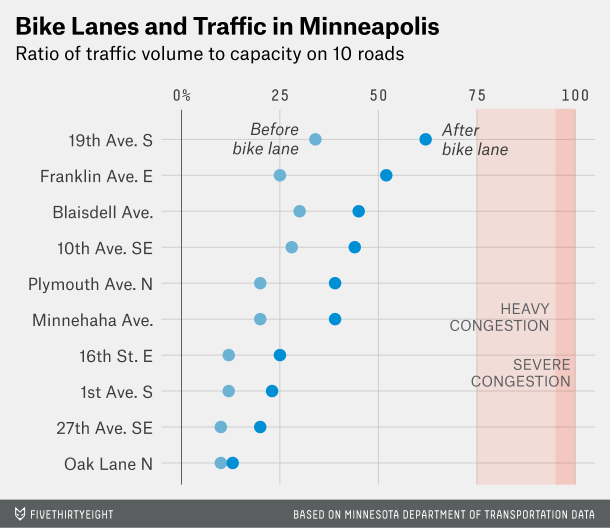
Gretchen Johnson and Aaron Johnson have posted a nice debunking of typical "war on cars" rhetoric over at fivethirtyeight.
Johnson and Johnson gathered before-and-after traffic data from 45 miles of streets where Minneapolis installed bike lanes. They also looked at how Brooklyn's Prospect Park West bike lane affected traffic conditions.
They found, in short, that after the installation of bike lanes, traffic conditions did not meet the threshold of "heavy congestion," and the impact on space for motor vehicles was moderate enough that drivers' travel times would likely be unaffected.
None of the 10 Minneapolis streets reached a level where "minor incidents can cause traffic jams," although the bike lanes did edge two streets into the "mild to moderate" congestion category. The authors, a transportation consultant and aeronautics Ph.D., write that this "mild to moderate" level is "where traffic is still moving smoothly but you might notice that it’s a bit harder to move from one lane to another."
Meanwhile, on Prospect Park West, NYC DOT reported that there was no evidence that travel times increased after the installation of a two-way protected bike lane. The two Johnsons, after reviewing the data, say "we agree."
These are the findings you would expect to see when a street redesign converts excess space for cars into room for bikes. Afterward, there's less wide-open road space encouraging motorists to drive fast, and on Prospect Park West the city observed a big reduction in speeding after the bike lane was installed.
The Johnsons offer a compelling rebuttal to overheated "war on cars" rhetoric, but the piece is also couched in the assumption that bike lanes are only worth it if they don't lead to congestion. "Bike Lanes Don’t Cause Traffic Jams If You’re Smart About Where You Build Them," reads the headline. Later on, they set up their data dive like so: "It seems that unless a ton of people start commuting by bicycle, giving away a lane would cause increased car traffic. But is this really the case?"
But sometimes the smart place to put bike infrastructure is exactly where it may lead to congestion. Why? Because no city can "get a ton of people to start commuting by bicycle" without a well-connected network of bike lanes. To create a seamless network with no gaps -- no places where people feel too stressed out or scared to bike -- you'll probably have to add bike lanes to streets where they'll lead to some congestion. And that's okay -- especially if everyone is safer as a result.
In American cities that are building protected bike lanes, there still tend to be gaps in the bikeways where traffic is really intense. In Manhattan, for instance, protected bike lanes on First and Second Avenue give way to sharrows on some stretches, to avoid creating congestion. While the safer bike lanes have led to significant increases in cycling, those gaps in the network will have to be filled in to entice the huge segment of the population who are "interested but concerned" about cycling to give it a try.
The fivethirtyeight analysis will come in handy in many cases, to show that traffic hasn't backed up where bike lanes were installed. But to create great bike networks that shift a lot of trips from driving to cycling, we'll need to build some bike lanes that claim space on the most trafficked streets.





